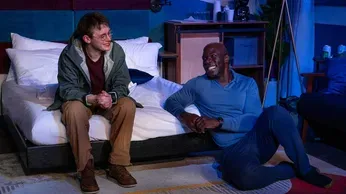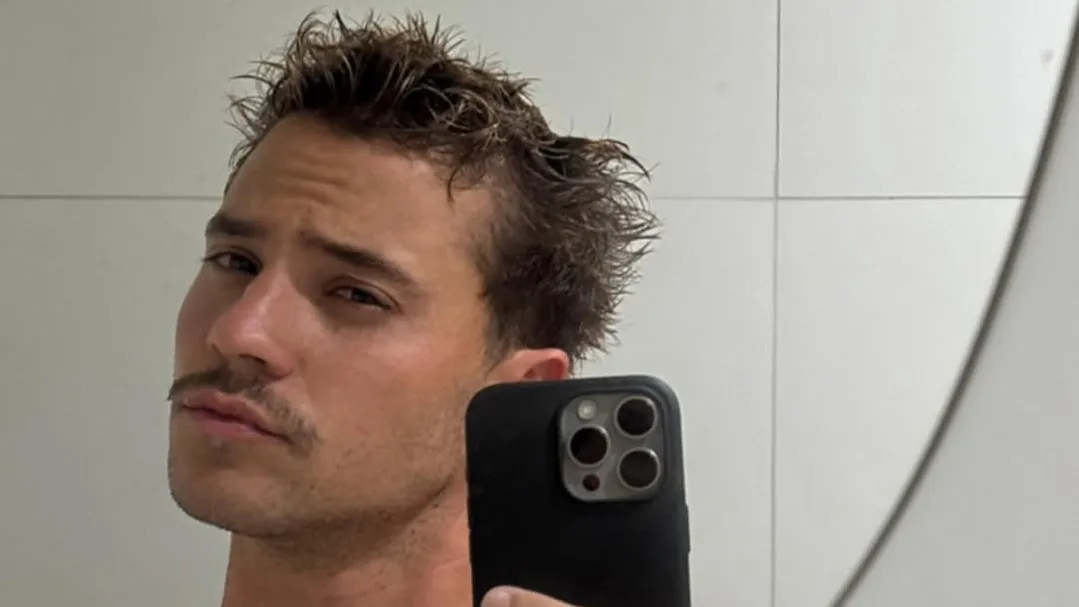
Jan 22
An Open, More Mature McKinley Belcher III Revisits 'A Guide for the Homesick' Off-Broadway
Nicholas Dussault READ TIME: 10 MIN.
"A Guide for the Homesick" is an 80-minute tale of two strangers who meet in a hotel bar in Amsterdam. When 30-something Teddy (McKinley Belcher III) invites 20-something Jeremy (Uly Schlesinger) back to his shabby room for a drink and a likely hookup, the duo find they have much more in common than just the desire for a little company. Guilt, shame, loneliness, and fear unfold in an intimate, erotically charged rollercoaster ride that builds to a crescendo of emotional carnage that'll leave you speechless. The actors each play two roles, and the lightning-round speed of their interchanging roles makes for riveting theater.
The play premiered at The Huntington Theatre in Boston in 2017, where McKinley Belcher III originated the role of Teddy/Nicholas and won the Boston Theater Critics Association Elliot Norton Award for Best Actor. He is back to the role seven years later for its New York premiere. Belcher's credits include TV's "Ozark," Netflix's "Marriage Story," and the role of Happy Loman in the groundbreaking 2022 Broadway revival of Arthur Miller's "Death of a Salesman."
Recently EDGE had the chance to chat with McKinley about his return to "A Guide for the Homesick," plus a little bit about his work with Tony winner Andre De Shields.
EDGE: You did this play at the Huntington seven years ago. What brought you back to it?
McKinley Belcher III: This has never happened before in my journey as an actor. Getting to revisit something I did seven years ago is like stepping back through a bunch of things that have changed me a lot. I've grown, opened, and matured. I was curious how that would manifest in a piece I've done already. On another front, I've become friends with Ken Urban, the playwright, and this was the piece I really wanted to champion and to sort of make sure it got its New York debut. I think it's an important thing for a play to be seen in New York, and so it was important to me to do what I could to help usher it through. When I did the play the first time, I used a documentary called "Call Me Kuchu" for research to listen to the accent and understand the social context of what was happening in Uganda. I've become friends with one of the guys that was in one of the documentaries. He has since moved to Boston as a refugee, so I had a personal stake in honoring his journey, a journey that I understand with more nuance now than I did before.
EDGE: Did the playwright make any changes to the script between productions?
McKinley Belcher III: I believe this was the third production of the play. I know Ken was toying with making Jeremy and Teddy from New York and New Jersey instead of Roxbury and Boston, but ultimately he didn't change that. He tweaked a couple of things here and there, like taking out a word for clarity, and then toward the end there's about a two-page span that has been rewritten. I think it was to clarify some things with Jeremy's arc, but also just to make sure the audience didn't miss some things.
EDGE: Do you think it would have been different if the characters were from New Jersey and New York?
McKinley Belcher III: I think there are some jokes in the play that wouldn't be there if they were from Jersey and New York, and there's a way the characters sound that would be slightly different. But no, I don't think it would be hugely different.







